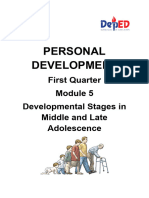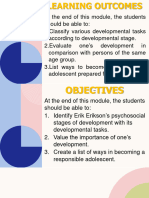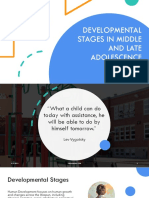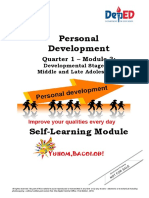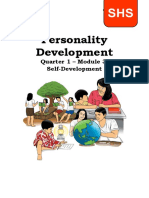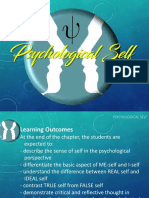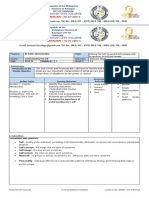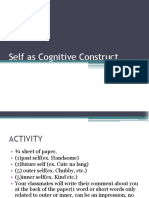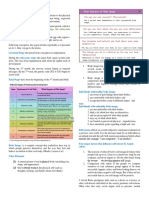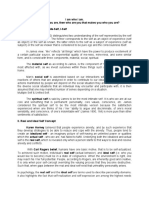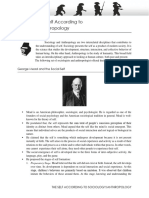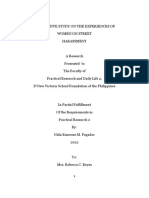LEARNING ACTIVITY SHEET
QUARTER 1/ SEMESTER 1/ Week 3
Name:_________________________________________________Score:_______
Grade & Section __________________________Subject: Personal Development
Name of Teacher: ____________________________________Date: __________
I. Title: Developmental Stages in Middle and Late Adolescence
II. Type of Activity: Concept notes with formative activities
LAS for summative assessment ( Written Work Performance
Task)
III. MELC:
1. Discuss developmental tasks and challenges being experienced
during adolescence (EsP-PD11/12DS-Ic-3.1)
2. evaluate one’s development through the help of significant
people around him/her (EsP-PD11/12DS-Id- 3.2)
IV. Learning Objective/s:
1. Discuss various stages in personality development.
2. Describe various developmental tasks according to developmental stage.
3. Evaluate their developmental in comparison with person of the same age
group.
4. List ways to become responsible adolescents prepared for adult life.
Page 1 of 16
�V. Reference/s:
For Print Material/s:
Personal Development, DepEd First Edition 2016, pg 19
Module in Personal Development 2nd Ed.2017, Doriden de Classica A. Fabre,
pg 21
Personal Development, Ricardo Rubio Santos, pg 41
For Online Resources:
https://www.google.com/search?q=erik%20erikson%20theory&tbm=isch&hl=fi
l&hl=fil&tbs&ved=0CAEQpwVqFwoTCOCtieSvn-
oCFQAAAAAdAAAAABAC&biw=1349&bih=667#imgrc=2viWYXQ_moCjJM/July
7, 2020
https://www.google.com/search?q=magnifying%20glass%20icon&tbm=isch&t
bs=sur%3Afm&hl=fil&ved=0CAMQpwVqFwoTCMC0wv2Jv-
oCFQAAAAAdAAAAABAC&biw=1349&bih=667July 9,2020
https://www.google.com/search?q=adolescence&tbm=isch&ved=2ahUKEwi3-
sHrv7_qAhVWAJQKHaTPBloQ2-
cCegQIABAA&oq=adolescence&gs_lcp=CgNpbWcQAzICCAAyBAgAEB4yBAgA
EB4yBAgAEB4yBAgAEB4yBAgAEB4yBAgAEB4yBAgAEB4yBAgAEB4yBAgAE
B46BAgAEEM6BQgAELEDOgcIABCxAxBDUM2DJVjGpCVgm6slaABwAHgAgA
GjAYgBlxGSAQQwLjE2mAEAoAEBqgELZ3dzLXdpei1pbWewAQA&sclient=img
&ei=TbMGX_efG9aA0ASkn5vQBQ&bih=667&biw=1349&tbs=sur%3Afm&hl=fil/J
uly 9,2020
https://www.google.com/search?q=stages+of+development+in+children&tbm
=isch&ved=2ahUKEwjohqGuycTqAhXXAZQKHfZHD6kQ2-
cCegQIABAA&oq=stages+of+development+in+children&gs_lcp=CgNpbWcQAzI
ECAAQEzIECAAQEzIICAAQCBAeEBNQ2KEBWIa5AWDWuwFoAHAAeACAAY
0BiAGHC5IBBDAuMTKYAQCgAQGqAQtnd3Mtd2l6LWltZw&sclient=img&ei=YF
wJX-
Page 2 of 16
� jWAdeD0AT2j73ICg&bih=667&biw=1349&tbs=sur%3Af&hl=fil&hl=fil#imgrc=ftrY
Qg0V1zl9tM/July11,2020
https//.depedtambayan/Rubrics for letter writing/July10,2020
https://www.google.com/search?q=developmental%20stages&tbm=isch&hl=fil
&tbs=il:ol&sa=X&ved=0CAAQ1vwEahcKEwjYloG528_yAhUAAAAAHQAAAAAQ
Ag&biw=1349&bih=667/August 27, 2021
VI. Concept Notes with formative activities
Between childhood and adolescence is a crucial
period of transition where a lot of changes may occur
such as physically, cognitively, socially, and even
spiritually.
Development in different aspects is distinct to
each individual. It is unique, moreover it can be
predictable and is determined mostly by the type of
climate at home (Psychological), it can be also affected
by customs and traditions, and oftentimes, it may be
influenced by physiological maturation, personal values
www.vectorstock.com and even the sociology of a person where an individual
belongs.
Erik Erikson’s Eight Stages of Personality (Psychosocial Theory)
Define in each stage of development is a crisis or a conflict. If resolved it will
result in favorable outcome, however, if unresolved may result to unfavorable
outcome. An important element of Erickson’s theory is the development of ego identity,
which is the individual’s conscious sense of self that develops through social
interaction. This will help us understand more our development compare to others
within the same age group at different stages.
Page 3 of 16
�Figure 1 favorable or unfavorable?
www.sitesgoogle.com
Page 4 of 16
�The following are some of the list included in the Havighurst developmental task.
Age Range Developmental Task
Infancy and early childhood ➢ Learn to walk
0-5 years old ➢ Learning to take solid foods
➢ Learn to use the toilet
➢ Learn to talk
➢ Learn to form relationship with
others
➢ Developing a conscience
Middle Childhood ➢ Learning an appropriate sex role
6-12 years old ➢ Developing acceptable attitudes
toward society
➢ Learn school- related skills such
as reading
➢ Learn about conscience and
values
➢ Learn to be independent
Adolescence ➢ Achieving masculine or feminine
13-18 years old role
➢ Establish emotional
independence
➢ Learn skills needed for productive
occupation
➢ Achieve gender –based social
role
➢ Preparing for an economic career
➢ Establish mature relationships
with peers
➢ Desiring and achieving socially
responsibility behavior
Early Adulthood ➢ Choose a life partner
19-30 years old ➢ Establish a family
Page 5 of 16
� ➢ Take care of a home
➢ Establish a career
➢ Rearing children
➢ Starting an occupation
Middle Age ➢ Adjusting to aging parent
30-60 years old ➢ Maintain a standard of living
➢ Perform civic and social
responsibilities
➢ Maintain a relationship with a
spouse
➢ Adjust to physiological changes
➢ Satisfactory career achievement
➢ Becoming happy and responsible
adults
Later Maturity ➢ Adjust to deteriorating health
Over 61 years old ➢ Adjust to retirement and reduced
income
➢ Establishing relations with one’s
own age group
➢ Meeting social and civic obligation
➢ Meet social and civil obligation
➢ Adjust to loss of spouse
Human development is a very complex matter. Living organisms go through
various process from conception to death. Everyone is unique and as human beings
we possess wide range of capabilities from self -awareness, logical and analytical
skills, motivation, thoughts, decisions, even survival instincts. We all have the capacity
to grow and mature at a different phase and experiences. More often, it is a long
journey of self -discovery, improvement and realizations in life that makes as who we
will become.
Page 6 of 16
� www.dreamstime.com
Various things may influence human development like heredity, environment,
and maturation. Humans develops per stage with tasks in line with their age, whether
physical development, cognitive development, and psychosocial development. There
are different theories of personality development that will help us understand our
selves and others along different aspects and stages.
Task 1: You can do this
Write T if the statement is true and F if the statement is false. Put answers in a
separate sheet of paper.
_______1. Characteristics of personality is distinct to each individual.
_______2. The conflict to be resolved during early childhood (18 months
to 3 years) is autonomy vs. shame and doubt.
_______3. The most influential figure during infancy are the parents.
_______4. Lack of self -confidence during late childhood (3-5 years old) is
an unfavorable result.
______5. Community is the most influential figure for adults (25-65 years
old).
Task 2:
Direction: Draw a symbol to represent your development for each stage in the box
and put a brief explanation why you choose that symbol for your development in that
stage. Make it simple but creative as possible. Try to recall your achievements per
Page 7 of 16
�tasks and you may include in the brief explanation/discussion. An example is
provided for you in the school age box. Use a separate sheet of paper for your
answers.
Infancy (birth to 18 months) Early Childhood Late Childhood
(18 months to 3 years) (3-5 years)
School Age (6-12 years) Adolescence (12-20 years)
I am like a ball, so playful
with my peers, bouncing
freely to find myself in the
ground and back to the ring
where I belong.
Task 3: Answer the following questions based on task 2. Answers will be put in a
separate sheet of paper.
1. How do you find this activity?
2. Did you recall your development per stage?
3. What theory of development did you use as your guide?
4. How can you compare your growth and development with your peers?
5. Do you think you have the same level of development per stage? Why or why
not?
Page 8 of 16
�6. How can you describe your development per stage? Which part for you was the
most crucial stage? Why did you say so?
7. If given a chance to be an object what will you be and how can you relate it with
your present stage, peers, family, parents, and community?
Task 4 You can do more
Direction: Recall your development per stage and fill up the columns corresponding
your answer. You may ask your parent/ significant others to recall some of your
achieved tasks per stage. Use separate sheet of paper for this.
My Developmental Task Summary Table
Infancy and Early Middle Childhood (6-12 Adolescence (13-18
Childhood (0-5 years years old) years old)
old)
➢ Learning to walk ➢ Developing ➢ Preparing for an
conscience, economic career.
morality, and scale
of values
Task 5
Replicate another table to be filled up by your peer with same age as yours.
You may interview them through phone to get their answers or it is better when you
have a close friend whom you know well for this activity. They may also ask help
from their parents/ caregiver for the stage they may no longer recall. Then, answer
Page 9 of 16
�the follow up guide questions after the table. On the first lines of the table, a sample
is given for your reference.
My Peer of Same Age Developmental Task Summary Table
Infancy and Early Middle Childhood (6-12 Adolescence (13-18
Childhood (0-5 years years old) years old)
old)
➢ Learning to talk ➢ Getting along with ➢ Accepts one’s
age mates physique.
Task 6
Using the Developmental Summary table on task 5, assess your own level
of development as grade 11/12 student. Use the worksheet below. Put
your answers in your activity notebook.
What are the expected What are the expected What are the
tasks you have tasks you have partially expected tasks you
successfully accomplished? have not
accomplished? accomplished?
Page 10 of 16
� Task 7 Challenge yourself
Directions: Read and answer the following questions. Write your answers on
a separate sheet of paper.
1. How did you find the activity on Fill in my memories?
2. Do you have the same developmental task with your peers of the same
group? What are the most significant answers you have in common?
3. What are your differences per stage? Why do you think you are not the same
in your accomplishments/tasks per stage?
4. Did you ask some information from your parents? How did they respond?
5. Do you believe that tasks per stage are influenced by individual’s
biology (physiologic maturation and genetic makeup?), his psychology
(personal values and goals) and sociology (specific culture to which
the individual belongs)? Elaborate your answer.
6. How can you develop your sense of identity?
7. Did you realize the changes that happens to you at your age?
8. How do you compare it with other persons of the same age group?
9. Do you always have the same phasing? If not, what are their
developments that you also want to enhance?
10. What maybe your developments that you think they lack and why?
Task 8
Direction: List down the changes that you had observe from yourself and others at
your age. Try to analyze your similarities and differences then on the next column
aligned with your answer, list down ways to improve yourself and how to adjust with
these changes. Put your answers in a separate sheet of paper.
Page 11 of 16
�Changes observed in self Comparison (Put Ways to adjust and
and others at my age brief discussion improve or take care of
about your oneself
(Per Aspect of similarities and
Development) differences per
aspect of
development aligned
with column one.)
Physical/Sexual
Development:
Self:
Others:
Psychological
Development: (Include
behavioral and social
aspects)
Self:
Others:
Page 12 of 16
�Cognitive Development:
Self:
Others:
Task 9
➢ Think of one person you want to write a letter of gratitude. Express your
thoughts, and ideas about your
development per stage and how she/ he
had an impact in your life. Also
emphasize in the letter the most
valuable things you have learn from
him/her that will make you a responsible
adult. Be sure to give the letter to the
person and take note of his/her reaction.
www.educationquizzes.com
Page 13 of 16
�Task 10: Level Up
Complete the Table: List ways to become a responsible adolescent prepared for
adult life, based on the first column. Copy this and put your answers in your
notebook.
Developmental Tasks/changes Ways and preparation for adult life
1. Physical appearance >
>
>
2. Cognitive skills >
>
>
3. Human relationships >
>
>
4. Coping skills >
>
>
5. Identity >
>
>
6. Friendships >
>
>
7. Roles and responsibilities >
>
>
8. Social Responsibilities >
>
>
9. Work attitude >
>
>
Page 14 of 16
� 10. Spirituality >
>
>
Task 11: Answer the following questions based on task 10.
1. How do you find the activity above?
2. How can you improve yourself as you mature?
3. Why do we need to develop and improve as we age?
4. List tips to become a more mature adult.
Task 12:
Direction: Assess yourself on the following stages of development. Make sure to
provide your honest answer which are factual and not opinionated. Put (/) if you think
you have a favorable result from resolving a conflict or crisis. Put (x) if you think
you showed or experienced unfavorable result for each stage given.
____1. I am able to trust my primary caregiver during my infancy, I felt their love,
attention and care, one manifestation is that, I don’t smoke cigarette at my age, so I
am orally satisfied when I was young.
____2. At three years old, I have the ability to cooperate and express oneself
already.
____3. At 5 years old, I already developed my sense of purpose.
____4. At 11 years old, I developed sense of competence and perseverance.
____5. At 13-17 years old, I already develop the ability to stay true to oneself.
____6. At preschool, I learn to become assertive.
_____7. At school age, I learn to become competent and I can persevere with school
and environment demands.
_____8. I am creative during my school age.
Page 15 of 16
�_____9. I know, I should be committed to tasks given to me.
_____10. I never lose hope. I am always positive that I can make things done.
Legend: If you have checked 8-10 items then congratulations you have favorable
results from resolving conflict and crisis for your age. If you have checked 4-6 items,
then it means to say that there are still some things that you need to overcome from
each stages of development appropriate for your age bracket. If you only checked 1-
3 items, then you need to reflect again and do something to overcome your personal
crisis and conflicts per stage applicable for your age so that you can step to the next
stage of your development in a more favorable/ positive result.
Page 16 of 16














